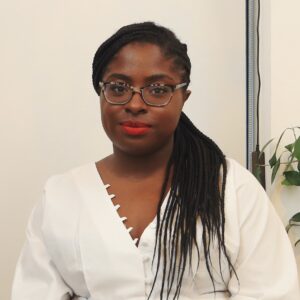The Graduate School has named Zari Taylor, a Ph.D. student in the Department of Communication, as its 2022-2023 senior fellow for the Weiss Urban Livability Program. Taylor, from New York City, participated in the fellowship program as a first-year graduate student in 2019. In her role as senior fellow, she will facilitate interdisciplinary opportunities for students, including academic seminars. The Weiss senior fellow provides leadership for the fellowship program, which supports and recruits graduate students who share a common interest in urban livability.

Taylor is a 2018 alumna of the University of Virginia, where she studied English and African American studies. At Carolina, her research is focused on how algorithms and social media platforms reproduce and exasperate existing socioeconomic inequalities across race. Her research also considers how beauty capital dictates visibility within apps like TikTok and Instagram and lead to disparities in the burgeoning influencer industry. The Department of Communication is housed in the College of Arts & Sciences. We spoke with Taylor about her aspirations for the upcoming year.
Why did you want to apply for the senior fellow position?
For me, the importance of the fellowship is more so — how can we think or apply our different disciplines to the idea of urban livability, which affects the environment around us, beyond the classroom? What issues are pressing in our communities? … If I was able to come and give back to the program, I wanted to.
What’s been the best part of participating in the fellowship?
Talking with people who weren’t necessarily from our department. Being a first-year student, it’s easy to get stuck in the department you’re in. Having academic, yet casual and informal conversations, can show you what you do know about your field. It shows you how much knowledge you can bring. … I pushed myself to be involved in my department, but also to shape the career I want. If I were to be a professor, facilitating and leading a group of students is something I would need experience in. I’ve been trying to see what this looks like in my context— finding opportunities to practice skills that I’ll be able to use later.
What are you hoping to accomplish in the next year?
The first year of graduate school can be very challenging, especially for those who come in without a master’s degree, like I did. I want to acquaint students with the University and help them get acclimated in some way … I want to help them get through, find funding, and not to see seminars as mere obligations. I want to learn about the needs that they have. … I don’t want to put expectations on the fellows without knowing them and talking with them first. It depends on what the group needs and expects.
How has the Weiss fellowship supported you during your time at Carolina?
I came to Carolina for the communication program and the faculty who are here and could support my research. Weiss was helpful in determining whether I was going to come or not. The year of funding made Carolina more competitive than other schools that I applied to. It’s a fellowship that definitely helps to retain students.
The Weiss Fellowship, founded in 1992, is named for Charles and Shirley Weiss, who retired as professors from the University. The Weisses’ active involvement with the arts, education and civic organizations, coupled with extensive world travel, convinced them that an interdisciplinary approach is essential to improving the quality of life in communities. The Weiss fellowship provides full tuition, among other benefits, to recruit master’s and doctoral students to the University.
